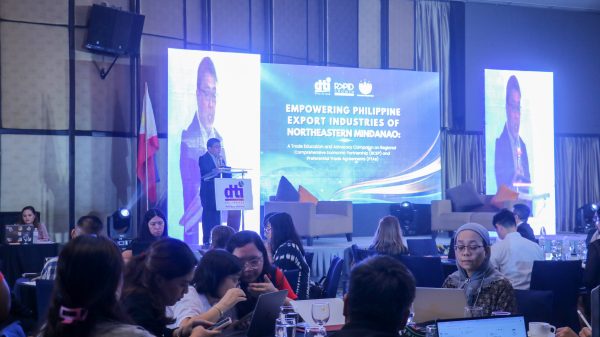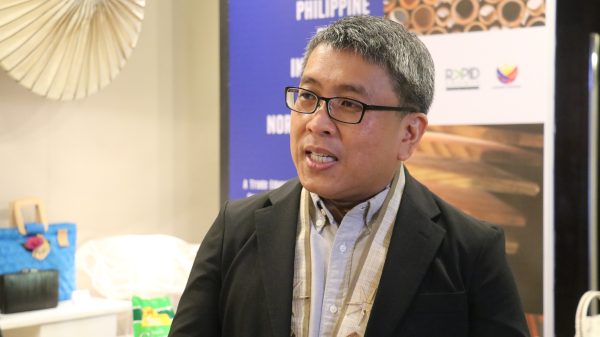CAGAYAN DE ORO CITY (PIA) — The Department of Trade and Industry (DTI) launched a new program to empower micro, small, and medium enterprises (MSMEs) in northeastern Mindanao to take advantage of international markets.
The Regional Comprehensive Economic Partnership (RCEP) and other preferential trade agreements (PTAs) were the focus of the Trade Education and Advocacy (TEA) campaign, which took place in Cagayan de Oro City on June 13–14.
The campaign brought together a diverse group of participants from northeastern Mindanao (Regions 10, 11, and CARAGA). This included business owners, chambers of commerce, industry associations, universities, local government representatives, and participants from DTI’s Rural Agro-Enterprise Partnership for Inclusive Development (RAPID) Growth Project.
It was intended to teach them about RCEP, FTAs, and other trade agreements and how to navigate foreign markets.

“Through this campaign, we aspire to empower our exporters and businesses, particularly MSMEs, to better engage the global market,” said Usec. Allan. B. Gepty of DTI International Trade Group, emphasizing that the FTAs offer more business opportunities for MSMEs to showcase their products and services.
“What is more interesting is that with the introduction of new elements such as sustainable development and e-commerce in trade and investments, more opportunities are now created. RCEP in particular offers a more feasible, cost-effective, and streamlined set of rules for exporters and importers to benefit from preferential trade agreements. It is for this reason that we are actively working on expanding our FTA network to advance our efforts to utilize these agreements,” Gepty added.
The TEA campaign goes beyond just informing businesses as it provides practical guidance on navigating international trade, which includes sharing best practices, discussing export opportunities, discussing trade remedy tools, addressing challenges in cross-border business, conducting workshops on understanding FTA rules, identifying export opportunities, and collaborating with the private sector to address challenges.
A “cliniquing” session also connected businesses with representatives from DTI, the Department of Agriculture (DA), the Bureau of Customs (BOC), and the Tariff Commission, providing valuable insights for overcoming export hurdles.
Global partners discuss trade opportunities
The campaign also fostered international partnerships. Representatives from the embassies of Australia, Indonesia, and China participated in the event, showcasing the potential for stronger trade partnerships within the RCEP framework.

First Secretary Simon Raid of the Australian Embassy in the Philippines emphasized the strong bond between Australia and the Philippines. He highlighted Australia’s large Filipino community, with over 300,000 Filipinos, making them the country’s fifth-largest diaspora group. This significant presence creates a natural opportunity for closer collaboration, particularly in trade. He stated that this potential partnership views the RCEP as a key area.
“This event is very timely for Indonesia since, if we look at the theme of “Empowering Philippine Export Industries of Northeastern Mindanao,” it is very contextual in our bilateral relations since just a couple of months ago, Mindanao and the northern part of Indonesia just reactivated direct flights from Davao to Manado,” said Minister Dodo Sudradjat, Deputy Chief of Mission and Head of Chancery of the Embassy of the Republic of Indonesia to the Philippines.
He underscored the importance of connectivity, emphasizing that it transcends physical proximity; the critical element is comprehending the necessary connections and how economic factors can enhance each other.
Second Secretary Zhao Chen of the Embassy of China to the Philippines acknowledges the challenges faced by RCEP member countries, including global economic issues, changing consumer demands, and slow economic growth.
However, she emphasized the RCEP agreement as a powerful tool to address these challenges. By working together and effectively implementing the RCEP, member countries can create a larger regional market. According to her, this will not only significantly boost regional economic growth but also bring much-needed stability to the global economy.
China, as the largest economy within RCEP’s framework, will keep working closely with other members to unlock the full potential of the agreement and our region. Together, we will build a prosperous region through agreement and win-win cooperation,” she added.
The DTI’s International Trade Group, Regional Operations Group, Industry Development and Investment Promotions Group, and the RAPID Growth Project organized the campaign. (APB/PIA-10)












